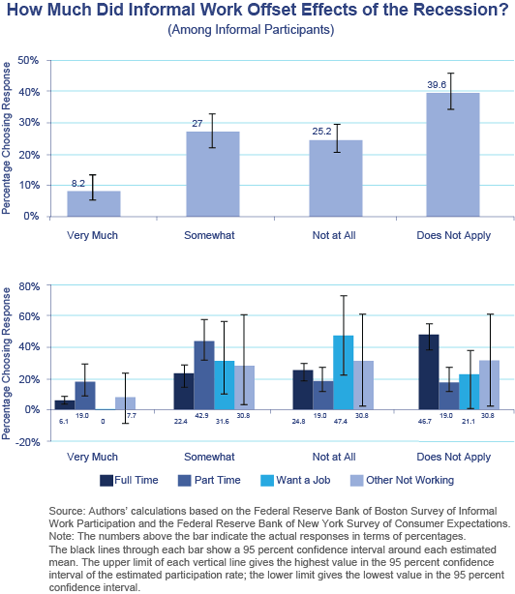2014 Series • No. 2014–13
Current Policy Perspectives
Informal Work Activity in the United States: Evidence from Survey Responses 
"Informal" work refers to temporary or occasional side jobs from which earnings are presumably not reported in full to the Internal Revenue Service and which typically do not constitute a dominant or complete source of income. Perhaps the most important reason for undertaking informal work is to offset negative income and employment shocks, such as reduced hours in a formal job, stagnant wages, or involuntary unemployment. Such negative shocks affected many Americans during the Great Recession, so it is important to determine the extent to which people engaged in informal work during this sustained downturn and how much it helped them economically. New web-based applications (such as Uber) that facilitate a variety of informal earnings opportunities mean that more people may undertake informal work. The authors designed the Boston Fed's Survey of Informal Work Participation (SIWP) to identify the types of individuals who undertake in such activities, how much they earn, their current employment status, how they rate the value of informal work in helping to offset negative shocks, and to explore how the Internet and mobile applications have facilitated the opportunities for engaging in informal paid work via the "peer-to-peer" economy.

 Key Findings
Key Findings
- The authors calculate the following informal work participation rates among four employment-status groups: 42.8 percent of full-time workers, 59.4 percent of part-time workers, 39.6 percent of those who report wanting a job, and 26.5 percent of those classified as "other not working." Overall, about 44 percent of the survey respondents reported participating in some informal paid work during 2011–2013—earning money was the most widely cited reason for doing so.
- Translating their four employment categories into the three official classifications used by the Bureau of Labor Statistics (BLS), the authors find that 26 percent of those people who the BLS define as "not in the labor force" (NILF) are engaging in informal work.
- In respect to offsetting the negative effects from the Great Recession, 8 percent of those participating in the informal labor market said that this work helped "very much" to mitigate these shocks, while 27 percent indicated that informal work helped "somewhat" to insulate them from the recession. Part-timers engaging in informal work appear to have benefitted the most—19 percent indicated that informal work helped "very much" to offset the recession's negative consequences.
- Over half of those reporting engaging in informal work indicated that they were performing Internet-based tasks, or making use of the Internet when doing such tasks.

 Exhibits
Exhibits


 Implications
Implications
Additional slack in the U.S. labor market may not be reflected in the BLS unemployment estimates, given the authors' finding that 26 percent of those they classify as NILF indicated engaging in informal work between 2011 and 2013. The high degree of participation in informal work among part-time employees suggests that as the U.S. labor market improves, this group may supply additional hours to the formal labor market. Finally, the growth of new technologies facilitating the informal sector should be further examined, as this could alter the labor market for some professions.

 Abstract
Abstract
Given the weak labor market conditions that have prevailed in the United States since the Great Recession, along with the recent emergence of web-based applications (such as Uber) that facilitate a variety of informal earning opportunities, we designed a survey aimed at describing the nature and extent of participation in informal work activities in recent years and measuring its economic importance to participants. The survey, conducted in December 2013, shows that roughly 44 percent of respondents participated in some informal paid work activity during the past two years, not including survey work. The most common reason given for engaging in informal paid activity is to earn money (rather than to pursue a hobby, meet people, or maintain job-related skills). Among the participants, 35 percent say that informal work helped them either "somewhat" or "very much" in offsetting negative shocks to their personal financial situation experienced in the recent recession. Individuals with a part-time (formal) job are both most likely to participate in informal work (compared with full-time employees, the unemployed, and those outside the labor force) and most likely to report that such work helped them "very much" in surviving the recession. The high prevalence of informal work participation among part-time employees and the economic significance of such work to this group following the Great Recession suggest that a substantial share of them may be willing to supply additional hours to formal jobs as labor demand improves. Yet, because most of those who engage in informal paid activities do so online and because the number of applications that facilitate informal work is likely to continue to increase, we expect participation in the peer-to-peer economy to grow even as labor market conditions improve.



